
When life hands you lemons, go ahead and make a fresh-squeezed lemonade, but don’t toss out those peels. At least, not just yet. There are plenty of better uses for them – even before those citrus peels end up in the compost.
And if your ultimate goal is to go zero-waste in the kitchen, concocting your own DIY all-purpose cleaner certainly fits in with using up all scraps. Keep reading and you will discover just how easy it is. You may even wonder why you never thought of making a batch before.
Or maybe you landed on this particular page because you are interested in a naturally clean home. One that is healthy for you, your children, all pets and indoor plants.
Perhaps you have discovered through trial and error that you are allergic to certain chemicals or artificial scents. Many of which are extremely harmful, especially when flushed down the drain. In that case, listen up.
What I am asking you to do, is take a peek inside your cleaning cabinet and observe what name brands you have been using without judgment.
Then decide for yourself whether you wish to exchange those plastic colorful bottles in favor of a sustainable cleaning solution. One that can be made for pennies, that smells great and works like magic too.
Are you storing dangerous chemicals in your home?
Before getting to the how-to and know-how of making your own DIY all-purpose cleaner, I’d like to quickly ask another question.
Have you ever taken a really good look at all the ingredients that come in conveniently packaged household cleaners?
Most all-purpose cleaners contain the following ingredients:
- Alkyl phenol ethoxylates (APEs)
- Glycol ethers
- DEA, MEA and TEA
I’m not going to point out their harmful ways, as it has already been done here. But I am encouraging you to check them out if you are unfamiliar with what they do, both in your body and in the environment.
Another question arises from the mist: how toxic are your household cleaning supplies?
It turns out that “clean” doesn’t always mean healthy. Good smelling doesn’t always mean all is well. In fact, your chemical cleaners may just be poisonous.
Never fear, millions of people are waking up to the hidden dangers and you can be one of them too.
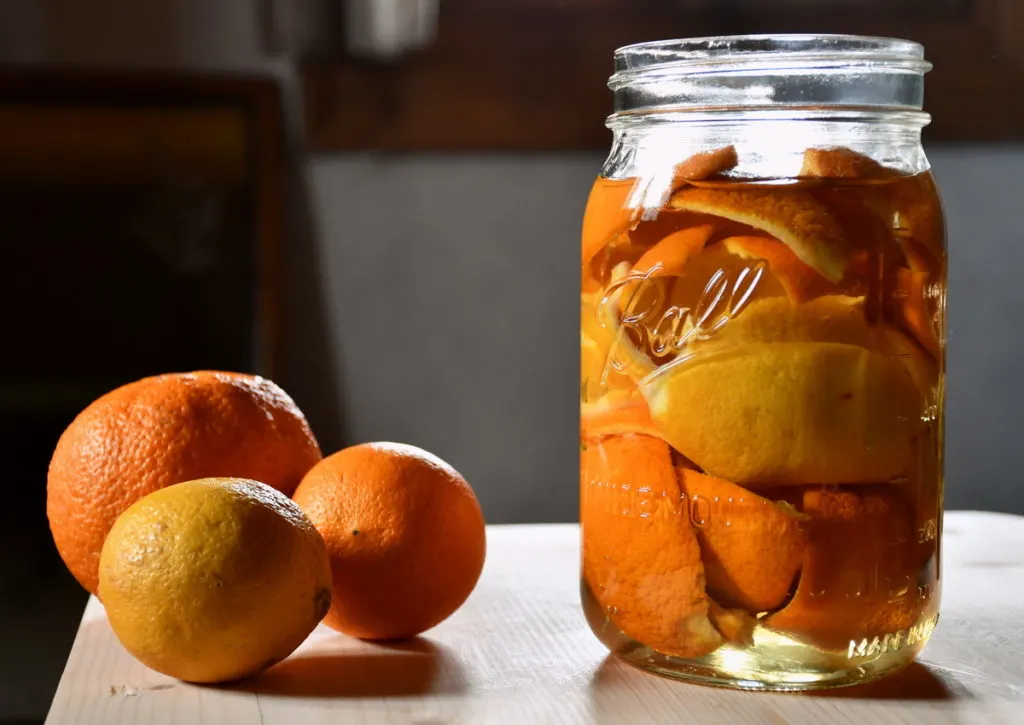
Making the switch to natural cleaners couldn’t be easier. Start with these 8 DIY natural cleaning products for the entire home and you will be well on your way to a healthier home and lifestyle.
Let’s move onto something brighter – more citrusy.
Citrus peels contain D-limonene, a powerful oil that works as a solvent for removing grease and dirt.
If you are using lemons, limes, oranges, mandarins or the like in your kitchen, chances are good that you have just been throwing the rinds away.
Today I’m going to help you put an end to that food waste.
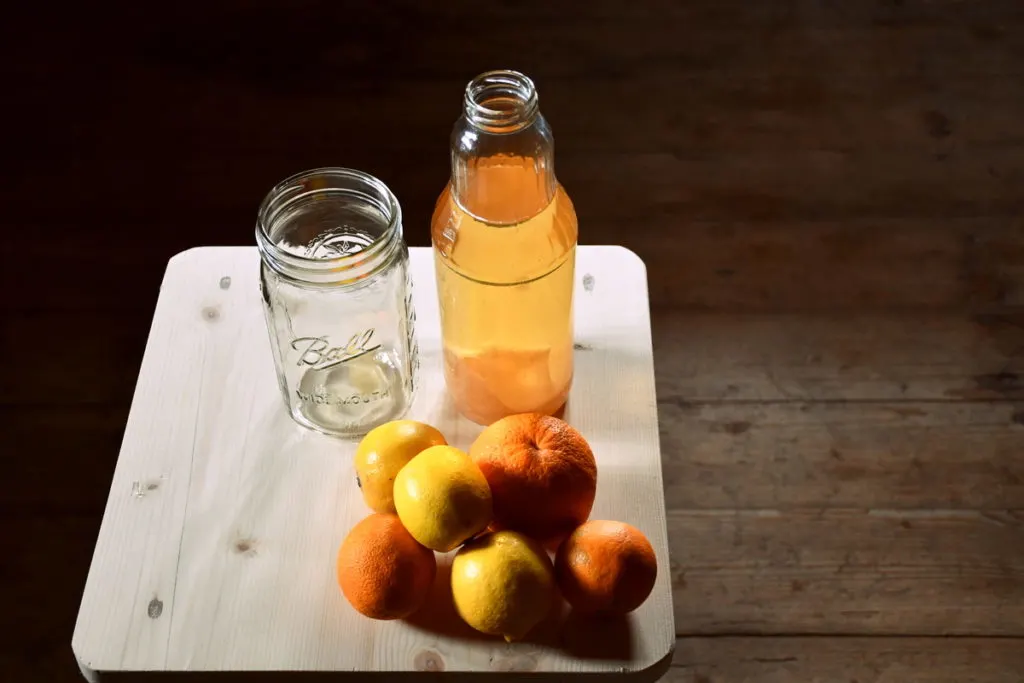
What you need are 2 simple ingredients, a jar and a glass spray bottle to make a DIY all-purpose cleaner:
- citrus peels, enough to fill a jar, organic if possible!
- white vinegar, apple cider vinegar or apple scrap vinegar
- a few drops of essential oils, optional (lavender, lemon, mandarin, pine, etc.)
With a little bit of waiting time (which you can use to declutter, garden or take care of your growing number of houseplants) your natural cleaner will be ready for use.
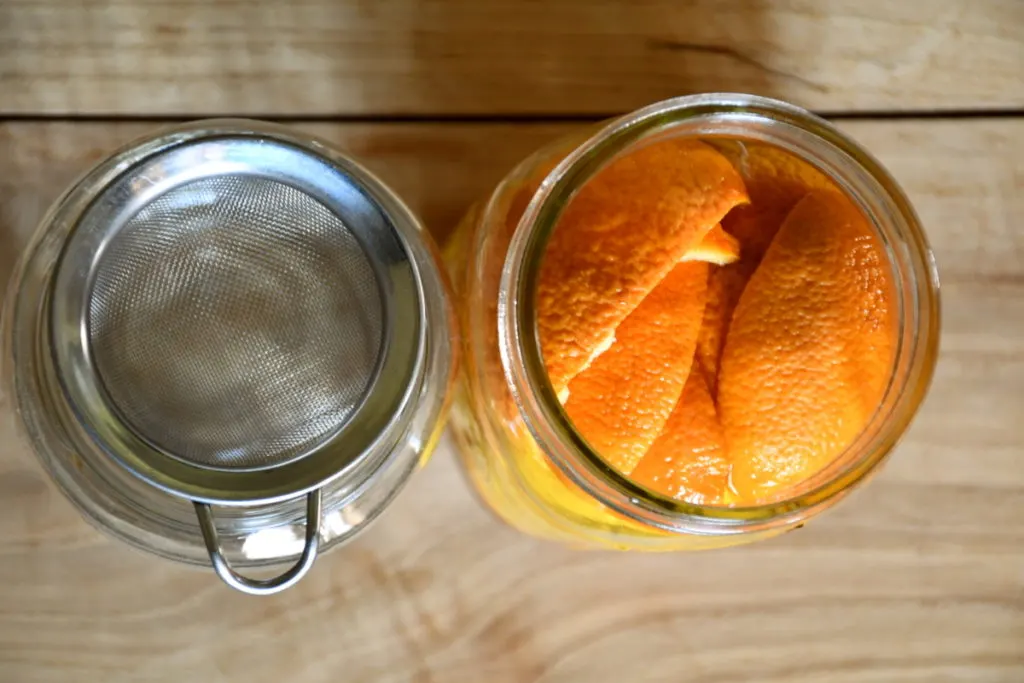
In the end, you’ll also need a mesh strainer, or cheesecloth, for removing all bits of peel and/or pulp (anything that would clog your nozzle).
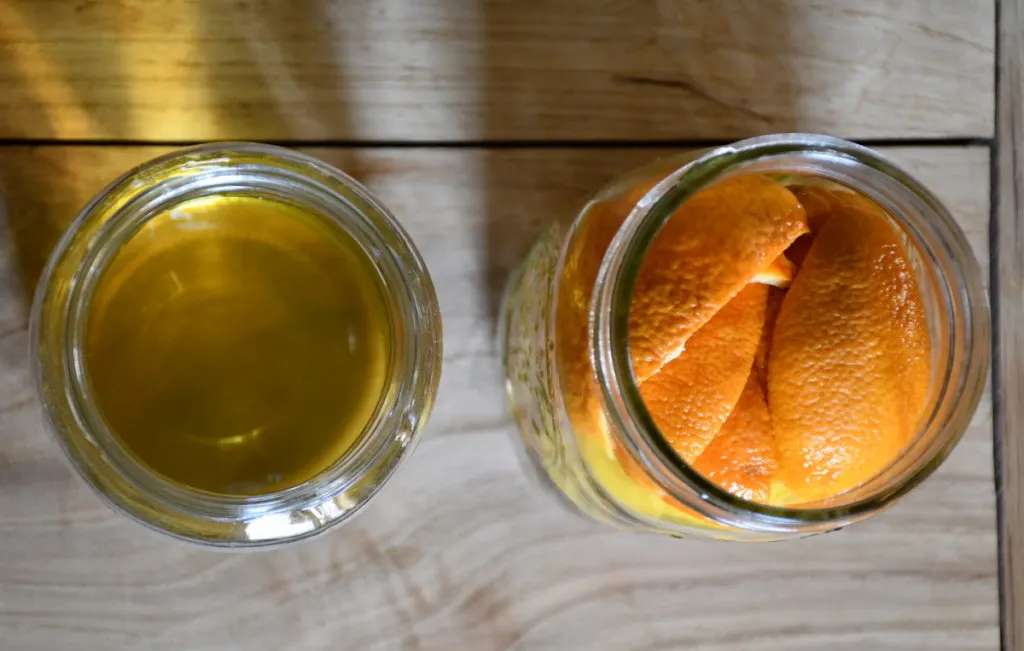
Give it a whiff – orange delight!
Making your DIY all-purpose cleaner with citrus peels
First things first, you’ll need to collect enough citrus peels to make your all-purpose cleaner.
Only use the peels of the fruit you are going to eat or preserve and nothing goes to waste. If you are making lemon curd, preserving lemon jam or marmalade you’ll always end up with a pile of peels.
Lemons, oranges, mandarins, limes, grapefruit – anything goes.
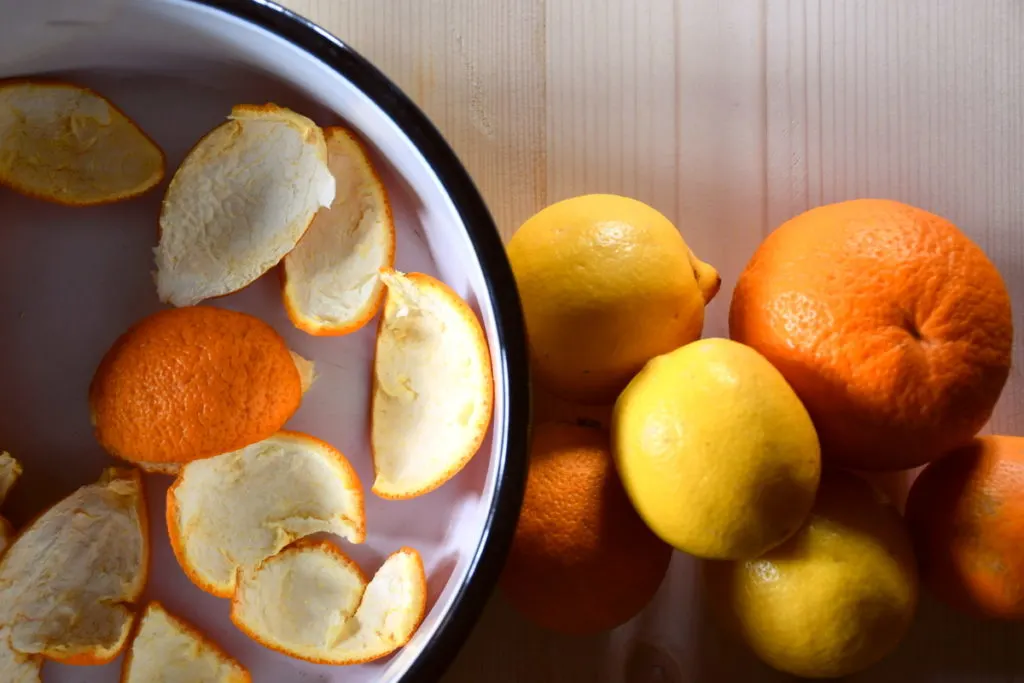
As many as it takes to fill a small jar.
As always, support organic farming when and where you can. After all, fruit trees can be heavily sprayed, and if you truly want to go au naturel, biologically grown is best.
If you can’t fill a jar at once, go ahead and let the peels dry out slightly as you fill up the jar. Or if you have a fridge, keep them in the cold until you have collected enough. Wait until the jar is lightly packed to add the vinegar.
It is also worth noting that not only the citrus peels can make it inside the jar. You can also add piths, membranes and seeds.
Adding vinegar to your all-purpose cleaner
Most recipes will tell you to use white vinegar. It is an effective cleaner and it is cheap. In other words, it works well for most applications.
However, we tend to use what we have. Since we have loads of apples throughout summer and fall, we also make apple scrap vinegar.
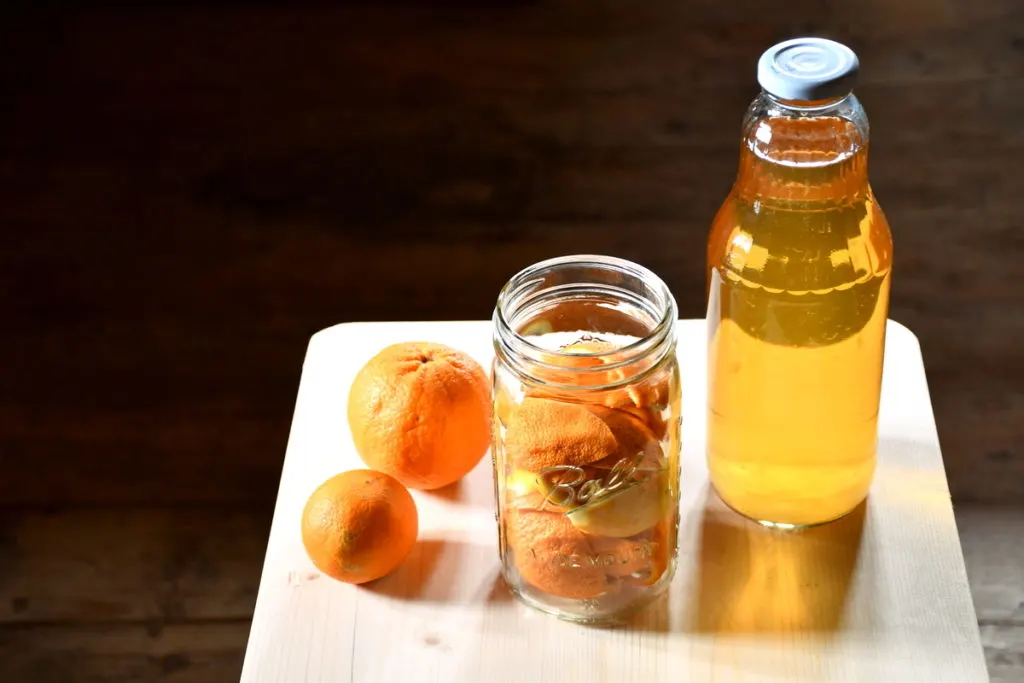
While it can’t be used for canning due to its lower acidity than apple cider vinegar, it is wonderful for making herbal-infused vinegar and of course, for cleaning.
DIY all-purpose cleaner with citrus peels
Once you have the ingredients, here is how to put it all together, including the wait time.
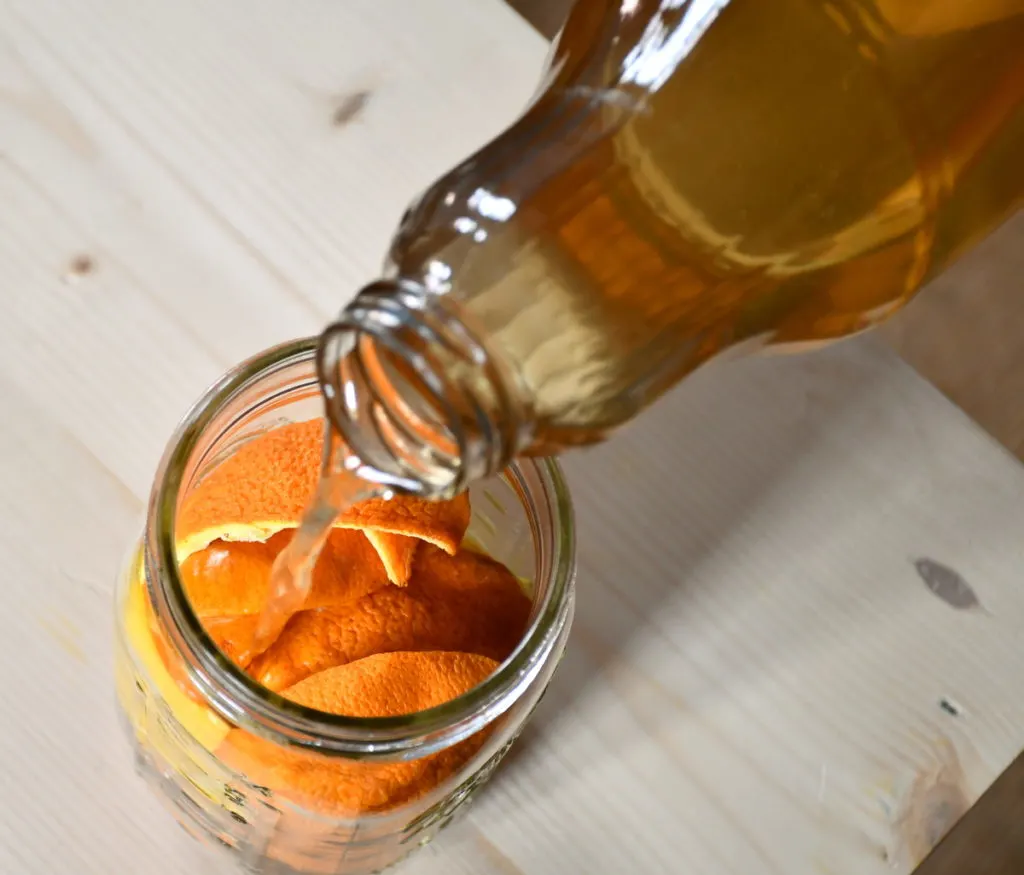
Instructions
- Pack a glass jar loosely with citrus peels, at least a handful.
- Top off with vinegar of your choice.
- Let it sit for 2-3 weeks on the countertop. Stir it up every few days to ensure that all peels are submerged.
- Strain and bottle your citrus-vinegar essence in an additional jar for safekeeping. You may even want to double strain it, so as not to create a potential clog in your spray bottle.
- Grab a funnel and transfer your citrus peel solution to a spray bottle.
- To dilute or not to dilute? The choice is yours and it depends on what you are spraying. At first glance it is best to dilute your all-purpose cleaner and see how it reacts on the surfaces you are spraying.
- Get ready to clean!
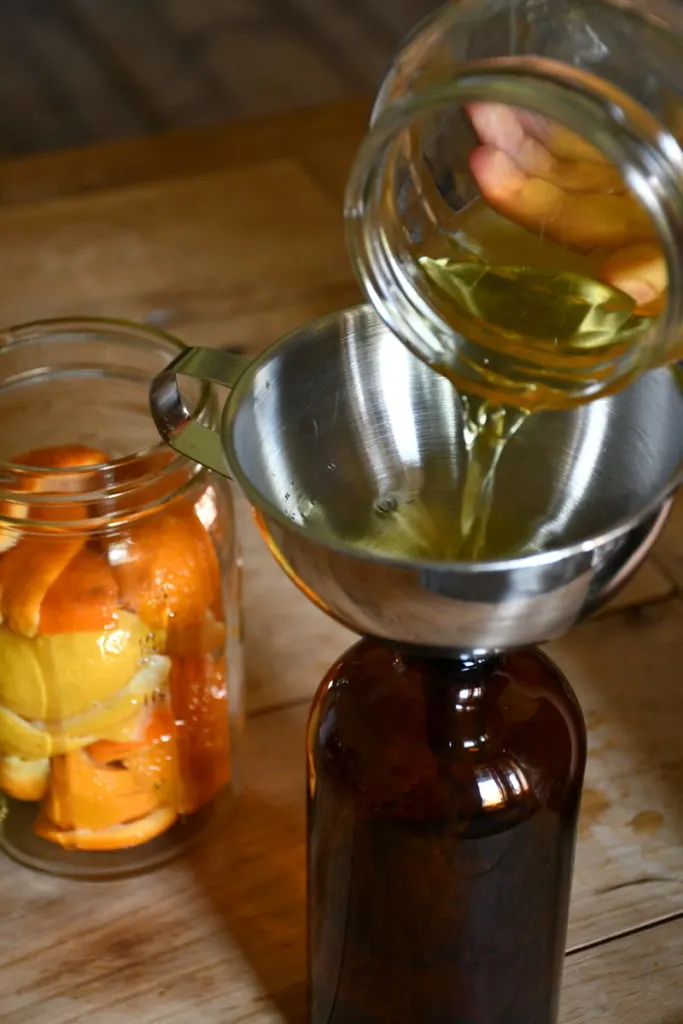
All in all, for stuffing a few handfuls of citrus peels in a jar with vinegar and waiting a few weeks, it really isn’t that much work.
What surfaces can you clean with your DIY all-purpose cleaner?
Once it is ready, you’ll be keen to try it out.
Not only does it smell fantastic, but it also works great too.
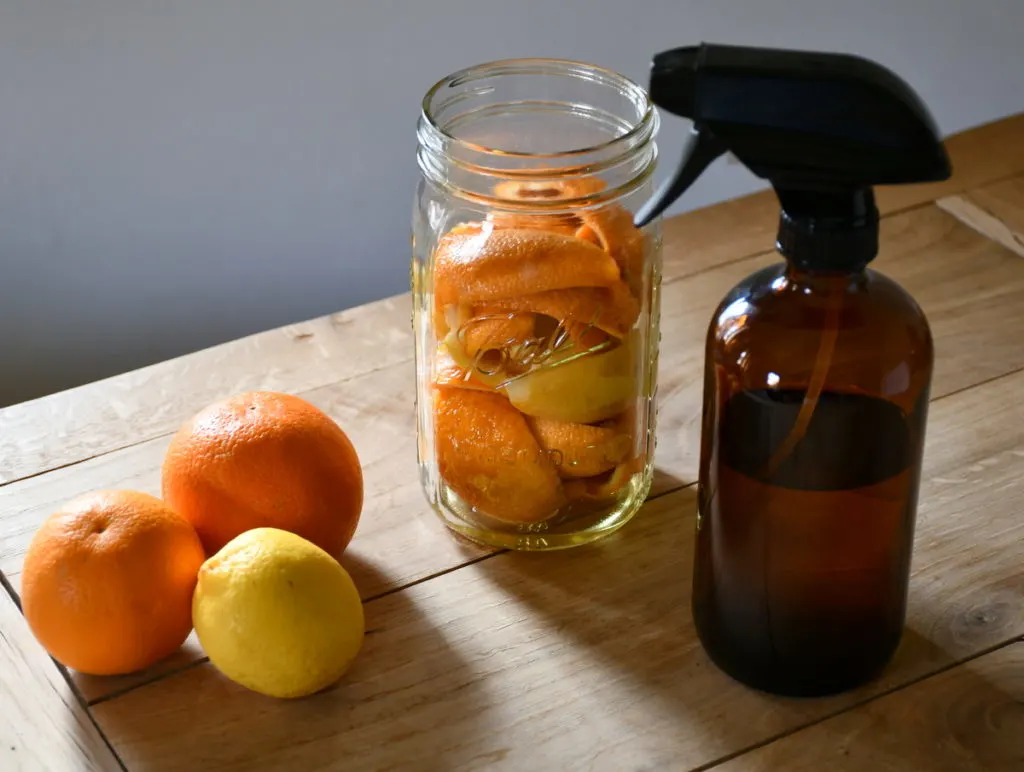
Feel free to spray your citrus cleaner on kitchen counters, sinks, showers, tiles, inside the fridge, appliances, and more.
It can even be used to get that stubborn onion and garlic smell off of your cutting boards.
Let it sit for a minute or two on the surface you wish to clean, then wipe it off with a natural sponge, or cotton cloth.
What not to clean with your citrus spray
Naturally, a citrus-vinegar combo can’t be wildly sprayed everywhere.
Never use vinegar on granite, marble, stone or hardwood floors, or on your tech screens. Tempting as it may be to wipe the dust off of your laptop, it is better to do that with a dry rag.
Always exercise caution when applying cleaners for the first time, natural or not, to see how the surface will react.
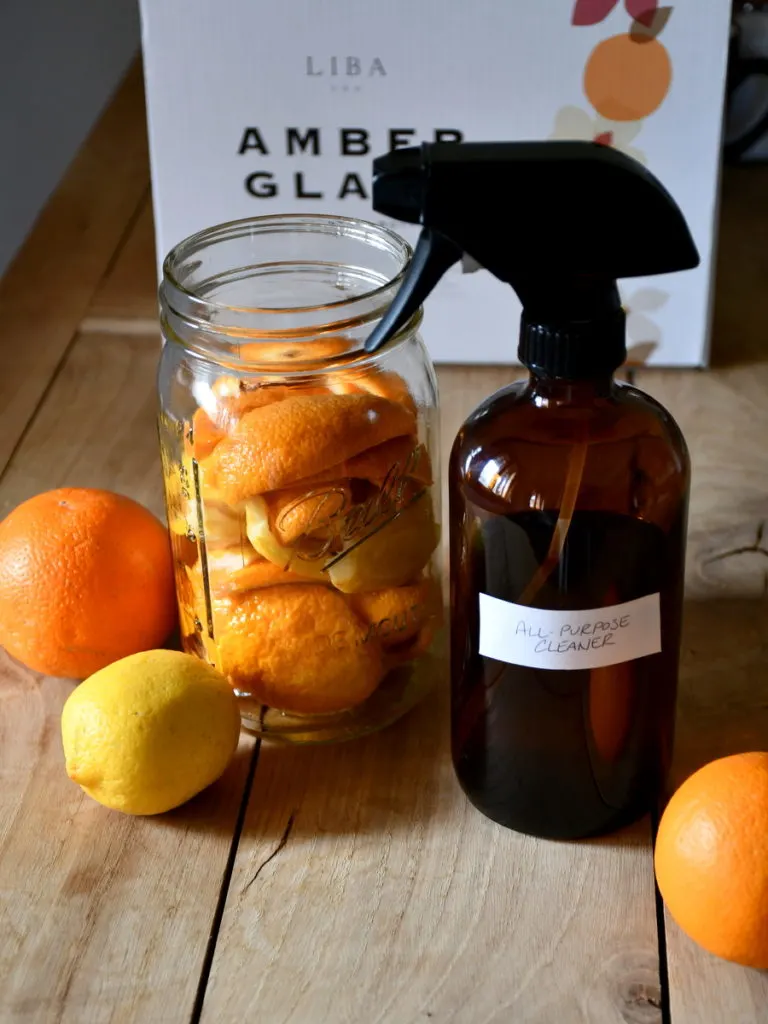
Store your all-purpose cleaner in a glass jar for best results.
Other than that, feel free to spritz away and experience what your future life could smell like, chemical-free.
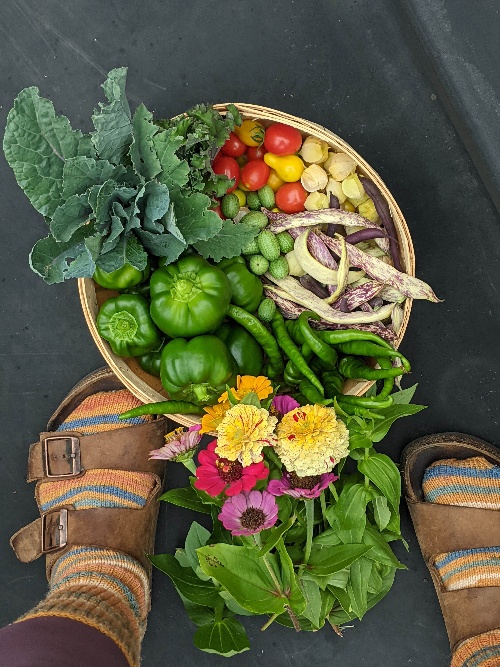
Get the famous Rural Sprout newsletter delivered to your inbox.
Including Sunday ramblings from our editor, Tracey, as well as “What’s Up Wednesday” our roundup of what’s in season and new article updates and alerts.

